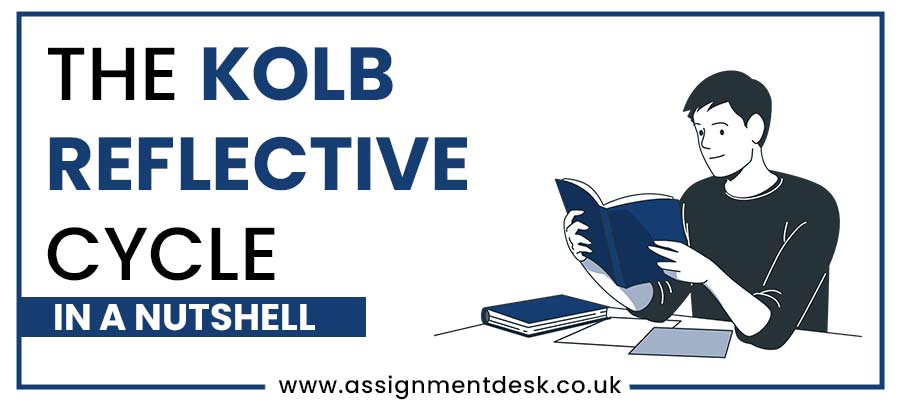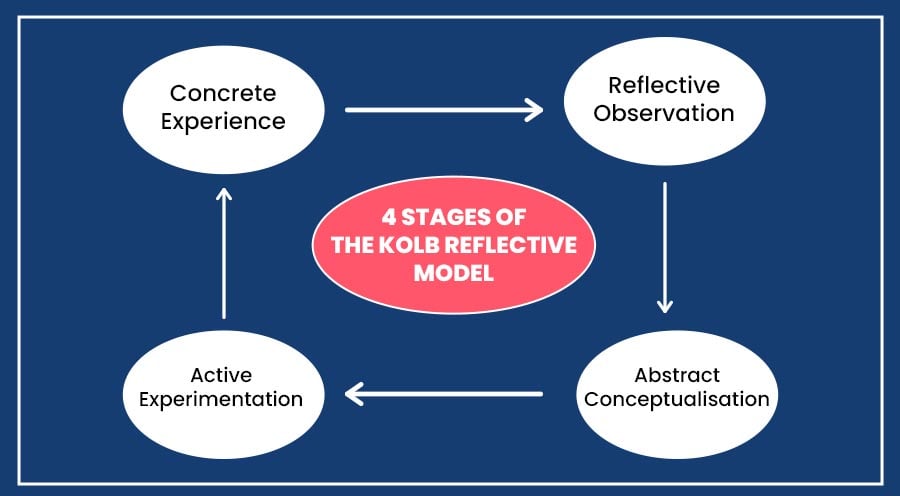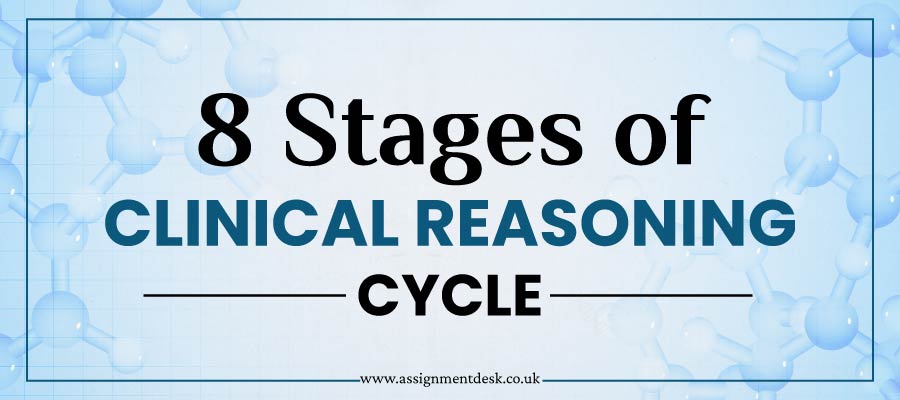Everything You Need to Know About Kolb Reflective Cycle
23 Feb 2024 2203
Table of Contents
- What Is the Kolb Reflective Cycle? | A Brief Overview
- How Did Kolb's Reflective Model Originate?
- Why Use Kolb Reflective Model?
- 4 Stages of the Kolb Reflective Model
- Learning Styles of Kolbs Reflective Cycle
- Pros and Cons of Kolb Reflective Cycle
- Most Asked Questions About Kolb Reflective Cycle
- Experts' Guidance on Kolb's Reflective Cycle
If you are a university or college student, you must be familiar with the word learning. So many students know the many reflective cycles and models like the Driscoll reflective model, etc. One of them is Kolb's reflective cycle. If you are unaware of this learning cycle, don't worry! With the help of the assignmentdesk.co.uk experts, you can learn about the various things that have been added. The best academic experts curate this blog to help university or college students get familiar with Kolb's model of reflection. So, for a better understanding, let's dive into the concept.
What Is the Kolb Reflective Cycle? | A Brief Overview
Before moving ahead, students must learn and get insights into Kolbs reflective cycle. It helps to understand things accordingly in a better way. So, in simple words, this is one of the models of reflection. It helps to look into the experience to understand and analyse it better before applying any actions. Experiencing things is one of its core theories of the Kolb's. As per his research and theories, he conveys that the learners should change or transform the other things to learn.
In addition, Kolb's experiential learning cycle focuses on how learners can change the result of experience, reflection, conceptualisation and experimentation. This Kolb reflective model indicates that learning occurs when the students come to understand and reflect on the things it is. It helps to analyse and formulate abstract concepts. Know why students should use thismodel for learning. However, if you have difficulty understanding this cycle, it is best to seek nursing assignment help from our experts.
How Did Kolb's Reflective Model Originate?
Kolb's reflective cycle originated in the 1970s. It was created by David Kolb, an American Educational theorist. Kolb's work was influenced by his experiences and observations in the fields of psychology, education, and business. Kolb's reflective model was first articulated in his influential book "Experiential Learning: Experience as the Source of Learning and Development," published in 1984. Overall, this model emerged from the synthesis of various educational and psychological theories. It focuses on experiential learning as a dynamic and continuous process.
It is also known as Experimental Learning Theory (ELT) which denotes that anyone can learn through direct experiences. When a person has a practical experience of something, he learns through his actions taken in that situation. This is how learning is facilitated. Kolb's reflective model is basically based on the reflection of direct experiences, which create a complete learning and development process.
Too Lazy to Write Your Kolb Reflective Model Assignment
Give It to Our Experts & Achieve A+ Grades Effortlessly
Get Assignment HelpWhy Use Kolb Reflective Model?
Well! There are several different learning models, but students think about why we should use Kolb's model and what is so special about it. So all your questions will be answered here. Out of all the learning techniques, experiential learning is found to be so practical and attractive. It is so understanding or implementing. Kolb's model works on this concept to make it easy for students. Kolb reflective model has four main stages in which the complete process is carried out.
As per the study of David Kolb, a student or the individual should go through the spiral of several immediate experiences that result in observations and reflections. All these reflections are connected with the previous knowledge and translated and submitted into abstract theories and concepts. In time, those results will be in the newer ways.
Also Read: Why Is Nursing More Than a Profession?
4 Stages of the Kolb Reflective Model
Let's look at the below-mentioned section and learn about the four stages of the Kolb Reflective Model. David A. Kolb provided the four-stage learning cycle. They are concrete learning, reflective observation, abstract conceptualisation and active experimentation. When the learner progresses through every stage, then active learning is achieved. Using the logical sequence, an individual can also enter the learning cycle at every step.

Stage 1: Concrete Experience
This is the first stage, where the learner showcases their involvement with other people in everyday situations. These are the scenarios that they face. This is one of the situations where the learner tends to depend more on feelings and open-mindedness. It also involves adaptivity to change. In this stage, a learner avoids the systematic approach to the situations and the problems.
Stage 2: Reflective Observation
Kolb's learning cycle is where the learners understand the situations and the ideas from a different point of view. Reflective observation depends on objectivity, patience, and careful judgement, but it does not essentially involve taking any action. All the opinions are created based on the feelings and thoughts of the learners.
Stage 3: Abstract Conceptualisation
This is the third stage for the learners. At this stage, they use ideas, logical approaches and theories rather than using interpersonal issues or feelings to understand the significant issue or problem. In most cases, systematic planning and the building of ideas and approaches to solve practical problems and concerns are used.
Stage 4: Active Experimentation
This is the final stage, which is called the active stage. By experimenting with various situations, the learners can show an active and valid learning experience. At the final active experimentation stage, the learners take a practical approach rather than simply using or observing the situation.
The above-stated are the four stages of the Kolb's learning cycle. Once you understand the reflective model, it will help you make it easier to work on. You might require it when writing a dissertation. Therefore, if you are unable to work on it, then it is best to seek nursing dissertation help on our platform. They will assist you with it as soon as possible. it's time to learn about the four distinct learning styles of the Kolb reflective cycle.
Also Read: What To Mention In Your Nursing Assignment To Make It Perfect?
Learning Styles of Kolbs Reflective Cycle
|
Diverging |
|
|
Assimilating |
|
|
Converging |
|
|
Accommodating |
|
With the help of the learning style, learners can enable learning to be oriented according to the preferred method. Every individual responds to the needs and stimuli of all types of learning techniques to one another. Individuals can use the emphasis that fits the person's learning and the given situation, along with the preferences of the style.
Here, we provide a brief description of Kolb's four learning styles.
1. Diverging
This is the learning style that deals with feeling and watching. They are people who can watch rather than do anything. They tend to gather information and use their imagination to solve different issues. These types of learners are best when viewing concrete situations from another point of view.
2. Assimilating
This is the learning style that deals with watching and thinking. It is the learning preference that involves a concise, logical approach. People are not as important as ideas and concepts. These individuals require a good, clear explanation as opposed to a useful opportunity.
3. Converging
This is the third learning style, which works by doing and thinking. Learners with the converging learning style can solve problems and use their learning to find solutions to practical issues. They prefer technical tasks, and they are less concerned with the people and the interpersonal aspects.
4. Accommodating
This is the fourth learning style that deals with doing and feeling. Also, it is called "hands-on" and relies on intuition rather than logic. They are the learners who use other people's analysis. They prefer to take the practical and experimental approach. These learners are attracted to the new challenges and experiences of carrying out the plans.
It is not easy to understand Kolb's reflective cycle. One needs to pay thorough attention to this section to learn about it. However, it is not everyone's cup of tea. Therefore, it is best to seek nursing essay writing service from our experts. They will be able to complete your task with the highest quality. Now, let's talk about the Kolb reflective cycle pros and cons for better understanding.
Also Read: Contemporary Issues In Nursing Practise and Study: 10 Untold Secrets
Pros and Cons of Kolb Reflective Cycle
The four different Kolb reflective cycle learning styles that every student should know are stated above. It will help students to proceed with the cycle effortlessly. But before moving to the conclusion, students must read the pros and cons of Kolb reflective cycle if they try implementing this.
|
Pros of Kolb's Reflective Cycle |
Cons of Kolb's Reflective Cycle |
|
With the help of the reflective cycle kolb, the divided stages of the learning styles, students can differentiate all of them. |
Some learning style aspects still need to be included. For example, they are societal, gender-based, etc. |
|
It helps to facilitate focusing on individual development in the step by step manner. |
This can be straining emotionally without the proper leader or any mentor. |
|
Learners can conduct an in-depth reflection on one's experiences. |
The number is low, but studies are encouraging this concept. |
If you think about it, you will learn that everything has its advantages and disadvantages, and they are somehow related to each other. The same is the case with Kolb reflective cycle pros and cons. Now, let's move to the next chapter, which will clear up any remaining doubts regarding this topic.
Most Asked Questions About Kolb Reflective Cycle
Are you curious to know more about Kolbs reflective model? Well, below are a few questions that will help you get a clearer picture of it. Go through these most frequently asked questions about Kolb's reflective cycle to have a better understanding.
1. How Does the Reflective Cycle Help in Career Preparation?
A: Reflecting on experiences in college, like internships or group projects, can help you identify skills, strengths, and areas for improvement. It prepares you for job interviews and makes you learn about showcasing your ability to learn and adapt.
2. Can You Give an Example of Using the Reflective Cycle?
A: Sure! Let's say you did a class project. After finishing it, you go to these 4 stages:
Doing: Completed a class project
Watching: You think about what went well or not so well
Thinking: Understand why things happened
Feeling: Wish to make it better next time
3. How to Reference Kolb's Reflective Cycle?
A: If you want to reference Kolb's Reflective Cycle, you should include the following details in your citation:
Author: David A. Kolb
Year of Publication: 1984
Title: "Experiential Learning: Experience as the Source of Learning and Development"
Place of Publication: Englewood Cliffs, New Jersey
Publisher: Prentice-Hall
For in-text citations, you can mention the author's name and the year of publication.
For example: (Kolb, 1984)
4. Can Kolb's Reflective Model be Used in Any Profession?
A: Yes, Kolb's Reflective Model can be used in any profession. It's a versatile tool that can help you learn and improve from your experiences. This model can be applied in education, healthcare, business, or any other field, as its goal is to enhance learning, problem-solving, and professional development.
Hope we have answered all your questions and doubts. However if you still have any other questions or need more help with Kolb Reflective Cycle assignment. Go through the next section to ger instant help.
Have to Many Tasks to Handle & No Time to Complete?
Place an Order Now to Get Expert Assistance & Exclusive Discounts
Get Instant HelpExperts' Guidance on Kolb's Reflective Cycle
The aforementioned is the complete information about Kolb reflective cycle. If you do not understand or have any questions, then you can consult assignmentdesk.co.uk. We have the best academic experts who can help you clear your doubts or provide you with the Kolb reflective cycle reference. So, feel free to understand the complete process of the learning cycle by consulting academic experts. They have a lot of experience and solve various students' queries. So what are you waiting for? If you still need clarification or are unable to complete your academic task and avail yourself of our writing services, you can get assignment help to get your work done by the submission date.
To Make Your Work Original
Paraphrasing Tool
Check your work against paraphrasing & get a free Plagiarism report!
Check ParaphrasingPlagiarism Checker
Check your work against plagiarism & get a free Plagiarism report!
Check PlagiarismDissertation Outline Generator
Quick and Simple Tool to Generate Dissertation Outline Instantly
Dissertation Outline GeneratorGrammar Checker Tool
Make your content free of errors in just a few clicks for free!
Grammar CheckerEssay Typer
Generate plagiarism-free essays as per your topic’s requirement!
Essay TyperThesis Statement Generator
Generate a Compelling Thesis Statement and Impress Your Professor
Try Thesis Generator Tool
FREE Features
-
Topic CreationUSD 3.87 FREE
-
OutlineUSD 9.33 FREE
-
Unlimited RevisionsUSD 20.67 FREE
-
Editing/ProofreadingUSD 28 FREE
-
FormattingUSD 8 FREE
-
BibliographyUSD 7.33 FREE
- Plagiarism
- Pricing
- Order Now
- Call Back
- Live Chat

Limited Time Offer
Exclusive Library Membership + FREE Wallet Balance
1 Month Access !
5000 Student Samples
+10,000 Answers by Experts
Get $300 Now
Update your Number


 Company
Company





